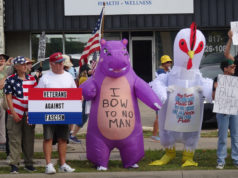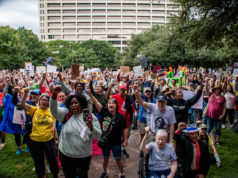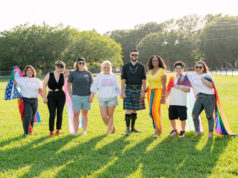Generics are not generally available until the patent lapses –– that’s 20 years in the United States. But the Indian government denied Gilead’s patents. So with the Indian pharmaceutical industry poised to duplicate the medication and sell it as a generic, Gilead stepped in and offered to license the right to Indian companies to produce the medication. This kept the Indian companies from having to devise a way to manufacture the drug, and as millions of people in India are infected with hep-C, even a royalty of a few dollars per pill would mean a significant profit.
Jefferys flew to India and was able to obtain treatment for $1,000 plus travel expenses. After he was cured, he started a buyers’ club for fellow sufferers. Hurley, skeptical at first, emailed him for advice.
“I totally understand your fears,” Jefferys wrote back, “but you may be assured that the current medication will clear the hep-C for sure. If you particularly desire to travel to India (which is a great thing to do), then I am attaching information. If you tell me which part of India you would plan on visiting, then I can certainly organize for you to meet the right people and buy your meds there.”
Hurley’s mother had just come into a small inheritance, and while she couldn’t afford the medication her daughter needed to live, she could fund a pilgrimage to India. Elle Hurley bought her plane tickets that day.

Jeffreys had set her up with Parag Jain, the CEO of Bull Pharmachem and the man whom Hurley now calls her “guardian angel.”
Jain gave her two choices: Acquire a prescription in the States for the medicine to be mailed to you, or come to India.
“I wanted to look somebody in the eye,” Hurley said. “I wanted to make sure. I think I’m a good judge of character. I felt that for me to be comfortable, I needed to look [Jain] in the face.”
But there were other hurdles. One was that her doctors were not supportive.
“I had to have my bloodwork redone,” Hurley said, “and I had to get an ultrasound done on my liver to make sure I didn’t have any cirrhosis. My specialist here refused to write me a prescription. I was flat out turned out by my specialist. They didn’t feel comfortable with it. I don’t understand that.
“Everybody was like, ‘We can suggest what you can do in the meantime to keep yourself healthy,’ ” Hurley continued, “and I was like, ‘No, there’s a cure. My tax dollars helped pay for that cure. I watched my father die of liver cancer. No thank you.’ ”
In June, Hurley gathered up her medical records and boarded a plane for Mumbai. A friend, Dorian Dane, decided to travel with her at the last minute for moral support. They checked into a hotel that Jain had recommended, and Hurley had arranged for a local doctor to look over her medical records and write her a prescription for the generic version of Harvoni. Jain brought the medication to the hotel.
“When he brought me my medication, he told me, ‘I’m doing this because’ –– and I quote –– ‘fuck Gilead.’ [Jain’s] goal in this is he wants people healthy. He is just as disgusted by Gilead and their obscene price tag.”
Hurley spent 10 days total in India, from the time she left Fort Worth to the time she returned. Side effects from the medication were minimal, an occasional headache and some fatigue. While she was in Mumbai, she checked out the local music scene, and her and Dane toured the local landmarks. At The Gateway of India monument, the two heavily tattooed women were mobbed by locals wanting selfies with them –– until the military asked Hurley and Dane to leave.
“The military … [said] we were in danger or something,” Hurley posted on Facebook along with a video of the encounter. “It’s cool. We didn’t argue, so then we went to the mall and found the McDonald’s.”
Still, Hurley says the people of India were friendly and welcoming –– despite many of them living in crushing poverty. After seeing children living on the streets of Mumbai, she called Josh Weathers, a local musician who recently dedicated his life to helping orphans in India and left him a message saying she wanted to adopt a little girl she saw on the street.
“For a heavily tattooed Western woman,” Hurley told me, “it was a very interesting experience. I had a wonderful time. I love India. I look at India as my pathway to rebirth, my second shot at life.”
*****

With Hurley’s husband and children waiting for her back in Fort Worth, she headed home to finish her treatment. U.S. Customs and Border Protection allows you to bring back only a few weeks’ worth of medication, but that was just enough for Hurley to finish her treatment.
In 2015 alone, Sovaldi/Harvoni sales totaled nearly $20 billion, $9 billion more than Gilead paid for the company. Deals were made with insurance companies and government organizations to reduce price only after competitors entered the market with similar products, according to the Senate report. Gilead, according to dozens of published stories, faced outrage from the government, the insurance industry, and consumer advocates. Patients facing a death sentence from the disease were being forced to mortgage their homes to buy the medication they needed to stay alive.
Last week, the hacker group Four Thieves Vinegar Collective posted a video on the internet showing how to make a do-it-yourself version of the EpiPen, a device used to inject epinephrine for people who are at risk from life-threatening allergies. In 2009, Mylan, the maker of the device, had raised the price from $100 per unit to $600-plus. The collective’s version costs about $30 to build (not including the price of the medication). The collective has also been working on a machine to manufacture drugs that have been priced out of the reach of consumers who don’t have insurance. The plans for the machine, still in development, are available for free download.
“Sovaldi is the next molecule we’ll be trying to target,” said Four Thieves Vinegar Collective’s Michael Laufer. “We are in discussions with the computational chemists now about developing a new synthesis pathway.”
For Hurley, she’s just happy to have her life back. Her trip to India, including plane fare and a stay at a nice hotel, ended up costing about $2,500. Her medication was $1,200, and even with meals and doctors’ visits in Mumbai, her total cost was less than $5,000. On August 23, Hurley was tested again, and there was no trace of hepatitis C in her system. Today, she is trying to live a healthier life. She goes to the gym and has given up alcohol. She also has gone back to college and is working on a degree in music therapy. She’s been given a second chance at life and seems determined to make the most of it. A Transistor Tramps reunion is even in the works. But her family is what she feels kept her going.
“My main reason for talking to you and going public is that other people need to know there is hope,” Hurley said. “There is a real achievable path. I have two children who are worth more than a million dollars to me, and I need to be alive for them. I have a little girl who is autistic who needs me. So I found a cheaper route.”











